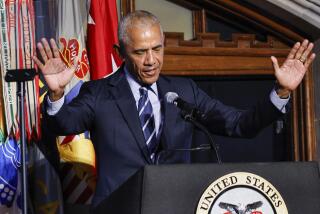Run locally, win nationally
- Share via
In their contest for the White House, Barack Obama and John McCain are expanding the campaign battlefield. Paradoxically, that may be the first step toward taming the partisan warfare in Washington that has blocked progress on the country’s most pressing problems.
One key reason Washington is so polarized is that American politics is so balkanized. Each party has retreated from the ambition of competing nationwide in presidential elections. After some early feints, George W. Bush eventually ceded the Northeast and the West Coast to the Democrats in both 2000 and 2004; Democrats Al Gore and John Kerry eventually wrote off the South, the Plains states and much of the Mountain West. Both camps accepted most of the nation’s red-blue divide as immutable.
In 2004, despite all the money and time that Bush and Kerry spent campaigning, only three states -- Iowa, New Hampshire and New Mexico -- voted differently than in 2000. Fully 34 states have voted the same way in each of the last four presidential elections. That’s the highest level of such consistency since before World War II.
This electoral stability has promoted rigidity in Washington. As each party has become more sectional and less national, its incentive to harmonize views from all regions and segments of American society has diminished. In Congress, Democrats from blue states have had little motivation to work with Bush because he attracted so little support from their constituents; the same dynamic hurt Bill Clinton among red-state Republicans.
Obama and McCain, in one of this year’s most hopeful signs, are refusing to passively accept that fate. Before the race concludes, both candidates may be forced to lower their sights. But at the outset, each is challenging the familiar red-blue boundary lines.
Already, McCain has frequently appeared in places that don’t usually see Republican presidential standard-bearers, including Seattle; Portland, Ore.; Youngstown, Ohio; Selma, Ala.; and Santa Barbara. Obama likewise opened his general election campaign in southern Virginia and Raleigh, N.C. He spent this week in Colorado and North Dakota before a Fourth of July appearance in Montana, not a spot where Democratic nominees typically watch the fireworks.
Obama’s advantage in campaign resources will make it easier for him to maintain this expansive focus. After the 2004 election, GOP strategist Karl Rove often said that Bush won reelection mostly because his campaign had recruited 1.4 million volunteers. Steve Hildebrand, Obama’s deputy campaign manager, says the Democratic team will dwarf that total. “If we do it right,” he says, “it will be four times that number. And I think we will do it right.” That volunteer “persuasion army” is the foundation of Obama’s ambitious plan to build neighborhood-level organizations in all 50 states.
Obama, with his huge fundraising capacity, has also already started airing television ads in 14 states -- from Alaska to Georgia -- that backed Bush. The Obama campaign, Hildebrand says, is committed to pursuing those states “with a full complement of staff, a full complement of media and a large number of [candidate] trips.” Obama’s aides are also eyeing four other potential red targets -- Arkansas, Mississippi, South Carolina and West Virginia. By contrast, McCain’s advisors acknowledge that his financial limits -- he’s accepting public money for the general election -- will compel him to focus his ad and organizing dollars more narrowly.
Expanding the playing field could expose both sides to second-guessing. McCain has already faced one occupational hazard of venturing onto the other party’s terrain -- pointed public criticism of his energy agenda from a panelist at his event in Santa Barbara. If Obama loses, his 50-state strategy is sure to draw accusations of hubris. And it is not clear that even this intensified courting will ultimately allow McCain or Obama to flip many states.
But simply making enough effort to run competitively in states usually written off to the other side could help the winner as president. The greatest flaw of Bush’s leadership style is that he appeared too content to govern, in effect, as president of his half of the country.
Earlier this spring in Selma, McCain memorably expressed an alternative view: “I’m going to be president of all the people ... whether they decide to vote for me or not.” Obama has offered similar sentiments. Those are all only words, but by contesting states that their parties usually concede, the two rivals are taking an important first step toward grounding them in deeds.
--
Ronald Brownstein is a senior writer at the National Journal. [email protected].
More to Read
Get the L.A. Times Politics newsletter
Deeply reported insights into legislation, politics and policy from Sacramento, Washington and beyond. In your inbox twice per week.
You may occasionally receive promotional content from the Los Angeles Times.










